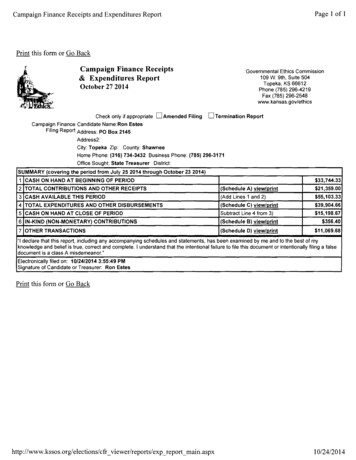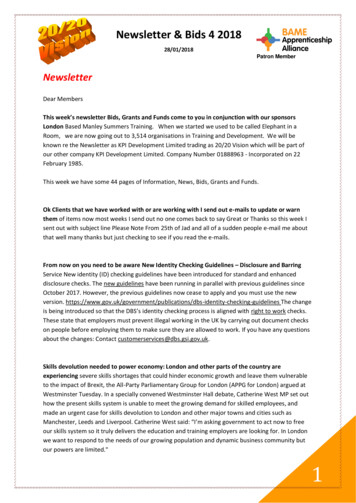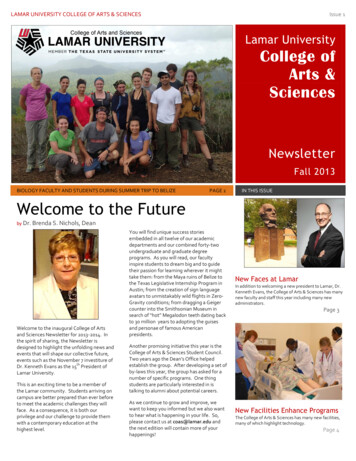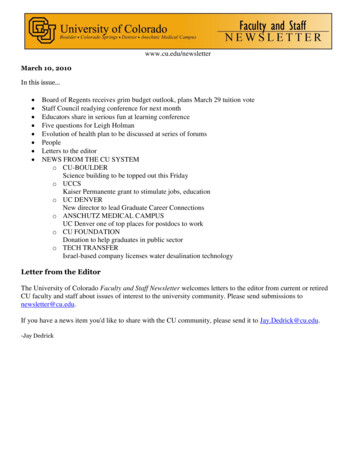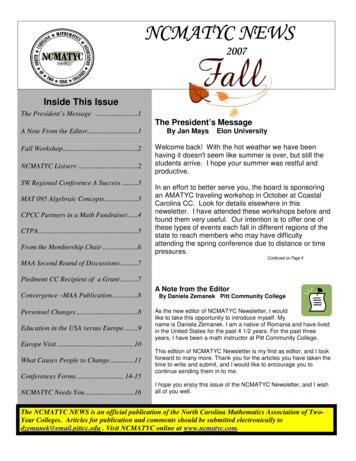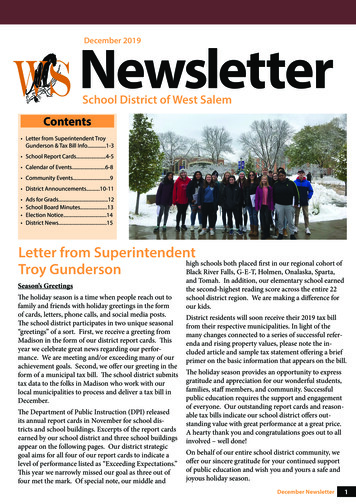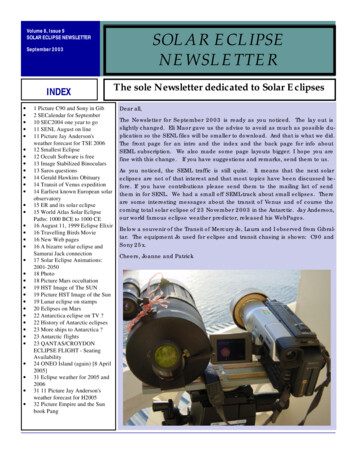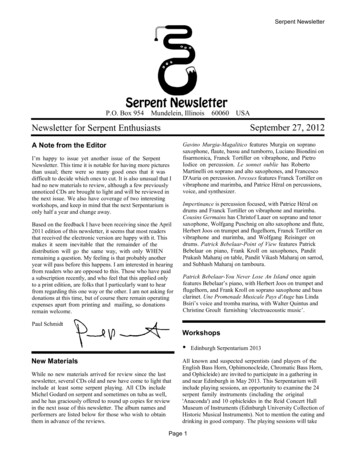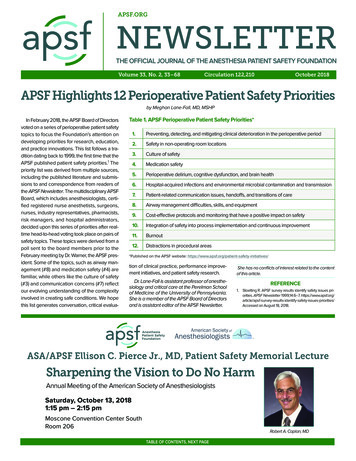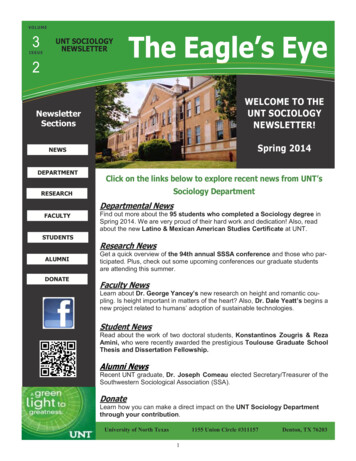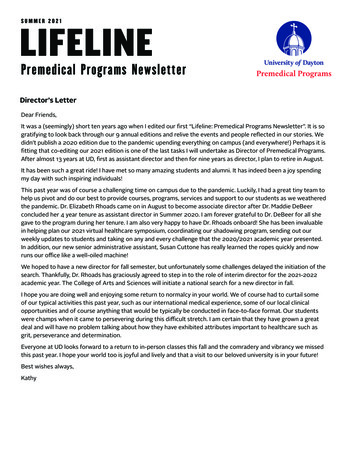
Transcription
UMR ANewsletterA Communication of the University of Minnesota Retirees A ssociationnovember 2015Lion researcher Craig Packer to speak atNovember 17 UMRA luncheonUniversity of Minnesota professor CraigPacker will address the topic “Lions in theBalance: Man-Eaters, Manes, and Menwith Guns.” This is also the title of hislatest book, published in September. It is achronicle of his experiences researching lionsand fighting for their survival in Tanzania,indeed, of lions throughout the many lioncountries in Africa.Craig Packer is a Distinguished McKnightUniversity Professor in the department ofEcology, Evolution, and Behavior at theUniversity of Minnesota. His first trip toEast Africa was in 1972 as a field assistantto Jane Goodall; he returned to Gombe in1974 to conduct his Ph.D. research on olivebaboons. After a brief study of Japanesemacaques in Hakusan National Park, hereturned to Tanzania in 1978 to head theSerengeti and Ngorongoro Lion Projects.His book, Into Africa, won the John Burroughs Medal in 1995, and he was electedto the American Academy of Arts andSciences in 2003.Over the past ten years, he has served as anofficial member of the Tanzanian Delegationto the Conference on International Tradein Endangered Species of Wild Fauna andFlora (CITES). He also founded an NGOto measure the effectiveness of foreign aidprojects in rural Africa. He has publishedmore than 150 scientific papers. Among thetitles are “Fear of Darkness: the Full Moonand the Lunar Ecology of African Lions,”“The Effects of Trophy Hunting on Lionand Leopard Populations in Tanzania,”“Group Territoriality and the Benefits ofSociality in the African Lion,” and “SportHunting, Predator Control, and Conservation of Large Carnivores.”Lions in the Balance, a sequel to Into Africa,continues to describe his own researchefforts and those of his students. It alsodescribes their practical efforts to preserveAfrican lions in the wild. One of his reviewers, Dr. George Schaller, the author ofThe Serengeti Lion, praises the book:“The king of beasts is in trouble throughout Africa as this hard-headed, clear-eyedbook makes unmistakable. Explosivehuman population in the lion’s habitat,NOVEMBERLUNCHEON MEETINGTuesday, November 17, 201511:30 a.m. – 1:30 p.m.Featured SpeakerCraig Packer, U professor ofEcology, Evolution, and Behavior“Lions in the Balance”LocationConference Room ABC,Campus Club, Fourth Floor,Coffman Memorial UnionMenuCod with Roasted Tomato Sauceover Fennel, Potatoes, and Kalecoffee and tea.For vegetarian or gluten-freeoptions, please request whenmaking your reservations.Reservations ARE RequiredDeadline: Thursday, November 12Prepayment of 16 per person;annual prepayers must also makereservations.conversion of wild lands into fields, corruptgovernment officials, unscrupulous overharvest by trophy hunters, illegal killingwith gun, poison, and spear, lion bonessmuggled to Asia—the litany of woe goeson and on. Craig Packer and his co-workers studied lions in the Serengeti But theyalso took on the moral task of protectinglions and helping them endure.”We look forward to hearing this scholarand active conservationist at our Novemberluncheon.— Hal Miller, past presidentTo reserve your place(s), sendyour check payable to UMRA toUMRA Reservations,c/o Judy Leahy Grimes,1937 Palace Ave., St. Paul, MN55105-1728Or, contact her before the deadline at 651-698-4387; e-mail:Jleahy4654@aol.com.Please honor the reservationdeadline date; if cancellations arenecessary, please call by Nov. 12.ParkingAll U ramps and East River RoadGarage with UMRA’s discountcoupon — 6 for the day.U MR A N e w s l e t t e r
from the presidentFood Waste. It is in our control.In the media we hear stories about the dilemma of foodwaste. Can it be possible that we consumers waste between 30 and 50 percent of the food available to us? Howcan this happen? What can we as individuals do about it?I have been studying food consumption and supplychains for a long time, and I am still amazed by theofficial statistics on food waste.* About one third of thesome 430 billion pounds of edible food available in theU.S. is wasted at the retail and consumer end of the foodsupply chain. It is estimated that about two thirds of thatloss takes place at the consumer (household) level. Thattranslates into about 90 billion pounds of food valued at 115 billion per year of wasted food.The concern about food waste comes from several directions: economic loss, environmental damage in land andwater use, moral dilemma of wasted resources in general,and projections about how many people could have beenfed with the food that was wasted.How does this waste happen? First, there are some losesinvolving trimming meats and vegetables, shrinkagein cooking, feeding pets, or donating food to charitythat are not truly wasted food. But, in the U.S. food isplentiful and relatively inexpensive. On average we spendless than five percent of our incomes on food at home,so throwing some food away is not a big economic lossto most individuals. Most of us buy too much as westock up for a week or more. We do not like to shop forgroceries very often. Increasingly, we buy fresh products,which are more perishable and subject to spoilage. Athome, food molds in the refrigerator and turns rancid ordevelops bug infestations in the cupboard.* Technically, food that is truly wasted is a subset of food lossand the data quoted is based on food loss. But in the popularpress all the data on food loss is referred to as “waste” and thatis the term used here. (Buzby et al., 2014 http://www.ers.usda.gov/media/1282296/eib121.pdf )2An important factor that has recently been recognized ascontributing to household food waste is “date labeling” onpackaged foods. Once thought to be a good source of information for consumers, these labels have yielded some unintended consequences. Consumers often interpret all thesedate labels as a signal to discard food for safety reasons whenin fact “best if used by” dates are placed by the manufacturersimply to indicate when the food is past its highest quality.“Use by” labels are the signal to use or discard or, in somecases, freeze the food product by the stated date. “Sell by”dates, are dates after which the retailer will (should) removethe product from the shelf. About one third of the product’s shelf life remains after this date, and these products areoften sent to food banks or “soup kitchens.”The message is that these date labels are confusing and maybe counterproductive. Studies of consumers’ understandingof these labels find that only about 40 percent of consumers can correctly interpret the meaning of the labels. Manytreat “use by” and “best if used by” as the same messageleading many to toss out good, edible food. (Newsome, etal. 2014: 7.12086/full)What can we do about food waste? First, just recognizehow much we waste and educate our families and friends.Seniors whose diets demand less food are especially vulnerable because we have to adjust our shopping habits and ourportion control in cooking and eating. Also, when we eataway from home, we often cannot eat all the food we areserved in a restaurant. Sharing meals and requesting thosedesigner “doggie bags” help reduce waste.As we exercise control over our food waste, we becomebetter custodians of our diets, our environment, and our relationships with our fellow human beings. This is somethingwe can do. It is in our control.— Jean Kinsey, UMRA Presidentjkinsey@umn.eduHave you renewed your membership yet?UMRA Photo Club meets November 20This is a reminder that memberships expired on August 31.Don’t miss out on new benefits, the newsletter, and noticeof UMRA activities. If you haven’t yet renewed, or havequestions about membership, contact Virgil Larson, UMRAdata manager, at larso071@umn.edu; 651-644-4562.To observe the holidays, the UMRA Photo Club, whichhad begun fall meetings on the fourth Fridays, will changetheir meeting dates in November and December to the thirdFridays. Meetings begin at 1 p.m. at the Hennepin CountySt. Anthony Branch Library. Please contact Sheri GoldsmithMay, golds009@gmail.com for more details.U MR A N e w s l e t t e r w w w. u m n . e du / u m r a
November workshop offers Movin’ andGroovin’ — just in time for ThanksgivingMembers will be asked to approve bylawrevisions at November luncheon meetingHow is the movin’ and groovin’ in your lifestyle? Come tothis workshop on November 17 to explore opportunities for“fine tuning” your physical, mental, and social health.UMRA bylaw revisions will be presented to the membersfor their approval at the November luncheon meeting. Inpreparation for this meeting, please see the UMRA web site:https://umra.umn.edu; click on the “About Us” menu item;click on the About Us – Documents pdf file: UMRA Bylaws2015 Proposed Revisions” to read or download the revisedbylaws and compare them to the current bylaws.Questions you may ask yourself: What brings me happiness? How am I promoting a healthy lifestyle for me? Am I reaching my full potential? How can I overcome barriers or challenges? What am I missing?Martha Feda, MA, MLS, is a health coach. Her passion isassisting people to reach their highest potential. She has amaster’s degree in Organization Management from Concordia University andmaster’s from the University of Minnesota LiberalStudies Program in PublicHealth, Adult Education,and Gerontology. Hercoaching education andskills are from TotallyCoached, Inc. and theCenter for Spiritualityand Healing at the Uof M. Martha has beencoaching for 10 years inthe metro area.The workshop follows the luncheon meeting on November17 at approximately 1:30 p.m. in Campus Club ABC. Allmembers and guests are welcome to attend this workshop.UMRA hosts 17 new members October 27Below: Membership committee member Joyce Guelich (center)greets new members Beverly Bybee and Manjula Gopatra at UMRA’sWelcome Reception and Orientation in the Campus Club Loungeprior to the October luncheon meeting.Thank you to the College of Continuing Education and itsLearningLife program for sponsoring the UMRA NovemberNewsletter. See their announcement below. CCE also offers a 15percent discount to UMRA members for LearningLife programs.Upcoming workshops to focus on financesMapping andInterfacing with theHuman BrainDr. Bin HeDecember 3cce.umn.edu/headlinersOn October 27 Carlson School professor Andrew Whitman led thefirst of three workshops on finances: Will your cash last? On January26, the topic will be Retiree Health Finances; on March 22, RetireeEstate Planning.LL0785 44 HL UMRA Newsletter.indd 1U MR A N e w s l e t t e r310/28/15 9:17 AM
Welcome new members to UMRACivic engagement: An offer we can’t refusePlease give a hearty welcome to new members who haverecently joined UMRA. Greet them at luncheon meetings,and help introduce them to other members.Do you skip over the monthly URVC article when you seethe “V” word? Are there more important matters than theneeds of our community—or your own well-being? Whenwe participate, we are engaged. We not only become intimate partners with those who use our skills, we become revitalized, mentally alert, psychologically uplifted, physicallystrengthened. You will live a fuller and longer life! Considerdoing your part in the following projects:Gloria M. DeRoode, U of M Child Development Center,Bargaining Unit1600 Rollins Ave. SE, P.O. Box 141074Minneapolis, MN 55455612-598-4735; deroo@umn.eduLonny and Francene Lebahn, Lab Medicine & Pathology,Civil Service2281 Edgcumbe Rd., St. Paul, MN 55116651-690-3700Carolyn Manthei-Lund and Jon Lund, Government andCommunity Relations, Civil Service6553 Arthur St. NE, Fridley, MN 55432763-571-6866; carolyn jon17@hotmail.comThomas and Loree Stinson, Applied Economics, Faculty2243 Ferris Lane, Roseville, MN 55113-3877651-647-0501; 612-625-1217; tstinson@umn.eduSaul Taylor, Department of Radiology, Faculty2950 Dean Parkway #1401, Minneapolis, MN 55416612-925-1313; staylor234@comcast.netFrom the Cares Committee BookshelfThe Wind Blows, the Ice Breaks: Poems of Loss and Renewalby Minnesota Poets. Edited by Ted Bowman and ElizabethBourque Johnson, 2010, Nodin Press: Minneapolis.Two years ago the editors led an UMRA workshop, sosome of you will remember this book. It is an extraordinarycompilation of poems speaking to the human condition.Moving, insightful, hopeful are descriptions of the collectedpoems that come to me. Words often fail the best of us intimes of loss, but these authors have found the words thatwill resonate with us at these times, and they have sharedsome beautiful poetry for such moments.— Earl Nolting, Cares CommitteeBecome a reviewer for ‘From the Bookshelf’The Cares Committee wishes to request assistance fromUMRA members in preparing the Newsletter’s “Bookshelf ”article. We know our members read widely and could sharea short summary of any truly good book. The committee isespecially interested in books dealing with health and aging,but reviews of good, well-written books on any subject arewelcome. We would like to recommend one book eachmonth, space permitting. Send your recommendations andreviews to umracares@umn.edu.4Do you Ski or Snowboard? (At least “intermediate” level?)Would you like to teach this winter activity to those withdevelopmental disabilities? Richfield Recreational Services isrecruiting teachers for One-on-One on Thursday nights inJanuary and February at Hyland Hills in Bloomington. Nocost to you: lift tickets, rentals, and required training provided. For detailed information contact University RetireesVolunteer Center: urvc@umn.eduNew continuing Research Projects seek subjects: “Perception of Limb Movement” at Human Sensorimotor Control Lab (2nd stage of this study is now open tostage 1 participants) MRI Brain study of control group to compare with Alzheimer Disease group “Attention and Memory in Older Adults” by PsychologyDepartment “Intranasal Insulin Study” for those with amnestic mildcognitive impairment or mild Alzheimer’s Disease atHealth Partners Center for Memory and Aging “Speech Intelligibility while Performing a Distractor Test”(control group to compare with Parkinson’s patients) atSpeech-Language-Hearing ScienceContact University Retirees Volunteer Center for any ofthese projects: urvc@umn.edu.— Alan Kagan, project director for URVC“Food for Thought” from the Cares Committee —A little simplification would be the first step towardrational living — Eleanor Roosevelt1666 Coffman units availableUNIT 108, MORRIS, 1,018 Sq. Ft., 2 Bd Rm South-facing on Courtyard, Living/Dining, 2 Baths, Kitchen, Patio,List Price 199,900. Lynden Realty; Barbara Swadburg 651271-8919 MLS# 4627462UNIT 118, MPLS, 1324 Sq. Ft., 2 BR Den, 2 Baths,Living/Dining, Kitchen, Laundry, and Fireplace. Choiceend unit w/3 exposures N.E. Price reduced to 234,900.Jeff Machacek, Coldwell Banker Burnet, 612-925-8277U MR A N e w s l e t t e r w w w. u m n . e du / u m r a
Staff and faculty retiree privileges at the University of Minnesota further explainedRetirees, both faculty and staff, retain lifetime access totheir U of M Google e-mail accounts as long as theyaccess them at least once every 3 months. See “GoogleAccount End of Life Policies,” , where it states: “The retiree willretain lifetime access to the account.”In an e-mail exchange with Peter Moore, who is OIT’s Service Director, Identity Management Services, he responded:“Apparently there is no official HR ‘policy’ on accountretention for retirees. The guideline that we’ve [OIT] beenfollowing for years is that retirees get to keep their accountsas long as they stay active (i.e. they check their e-mail or login every so often). I’m told that originally this only appliedto retired faculty and later it was expanded to include allstaff. If someone was told otherwise in the past they shouldtry again. And if someone hasn’t been ‘active’ they can callTechnology Help and ask for the account to be reinstated.”University Services and privileges for retired facultyFaculty privileges are defined in the University Administrative Policy, https://policy.umn.edu/hr/emeriti, whichelaborates on the basic Regents Policy.Faculty members who are granted emeritus/emerita status(all tenured and tenure-track faculty who retired in goodstanding) are entitled to the following services and privilegesprovided to regular faculty:1. E-mail accounts (including internet access);2. Library privileges;3. Listing in the University directory and mail service;4. Faculty discounts for computer hardware and software,recreation facilities, athletic events, and other performances and exhibitions;5. Continued parking privileges at faculty rates, subjectto space limitations when the next best alterative spaceshould be offered;6. Permission to audit graduate or undergraduate levelcourses, subject to the instructor’s approval and relevantUniversity policies and procedures;7. Access to health and dental insurance coverage at thefaculty member’s own expense according to Universityretiree policy;8. Participation in academic processions (graduations, convocations and the like) in a position of honor; and9. The right to represent the University at academic ceremonies of other institutions upon appointment by thepresident.These policies that pertain to faculty also appear to apply toretired P&A employees (although I have not been able tofind a specific policy so stating). However they do not applyto other job classifications: civil service and bargaining unit.But again, OIT policy as explained by Peter Moore does include civil service (staff ) retirees. That means your login at@umn.edu, plus your University Gmail account plus otheronline Google services. But you must use your login onceevery 90 days, or it will be set to inactive.If you do not currently have your umn e-mail account, andyou want to have it, you may have it restored by callingthe Technology Help desk at 612-301-4357.—David Naumann, Board Member and co-Webmasterdnaumann@umn.eduGrants program continues for seventh yearThe seventh cycle of grants to help retirees pursue projectsrelated to their scholarship has been funded by ProvostKaren Hanson and UMRA. All faculty members, professional and administrative, and civil service retirees from theTwin Cities and coordinate campuses of the University areeligible to apply for the grants (up to 5,000). Guidelinesfor submitting an application are available at our website:umra.umn.edu. The deadline for applications is December15, 2015. Awards are announced by the Office of the VicePresident for Research by March 1, 2016. Grants beginApril 1, 2016, and end on June 30, 2017.Eligible expenses include travel and per diem costs related toconference participation, stipends for undergraduate and/orgraduate research assistants, photocopying, the purchase ofbooks, computer, software, and other relevant costs. Ineligible expenses include salary for the applicant and institutional overhead charges. UROP, the Undergraduate ResearchOpportunities Program, has agreed to fund the cost ofundergraduate assistants who work with grantees. Detailsabout UROP are in the guidelines.Over the past six years, about 80 faculty and staff withdiverse interests have received grants. Visit the website toread the abstracts of the professional development projects.If you have questions, contact Janice Hogan [jhogan@umn.edu] or committee members Judson Sheridan, Richard Caldecott, Calvin Kendall, Kim Munholland, JoanneEicher, Russell Hobbie, Craig Swan, John Adams, PaulQuie, Hal Miller, John Howe, Roger Clemence, Bob Holt,Louis Janus, Donna Peterson, Dick Poppele, and KathleenO’Brien.—Jan Hogan, chair of the PDGR committeeU MR A N e w s l e t t e r5
UAM RUniversity of MinnesotaFirst Class MailU.S. PostagePAIDTwin Cities, MN.Permit No. 90155Retirees AssociationUniversity of MinnesotaMcNamara Alumni CenterRoom 264, Suite 250200 Oak Street S.E.Minneapolis, MN 55455-2002Have you changed youraddress, e-mail, or phone?1. Print new information below.2. Cut out this form and address label.3. Mail both to the address above.NameAddressCity, StateZip PhoneE-mailOther InfoWebsite: www.umn.edu/umraUMRA’s phone: 612-626-4403In RemembranceWe report the passing of UMRA members as we learn oflosses to our UMRA community. Since the Newsletter waspublished last month, we have received news of the following. Our condolences to the friends and families of:Thank you to the University of Minnesota Foundation forhelping to sponsor the November UMRA Newsletter.Pam S. Bridson, Ortho Surgery, union member, diedMay 1, 2015. She joined UMRA in 2014.Rosemary Hartup, Child Development faculty, died October 4, 2015. She had been an UMRA member since1997. Her husband, Willard Hartup, continues as anUMRA member.Evelyn Unes Hansen, Speech and English, General Collegefaculty, died October 5, 2015. She was a member ofUMRA until 2007.UMRA Cares Committee is here for supportFor assistance and support in the event of the deathor serious illness of an UMRA member or family member,please e-mail us at umracares@umn.edu or call 612-6264403, and leave a message for UMRA Cares.Also, if you learn of someone who is facing a difficult lifechallenge, please contact the UMRA Cares Committee.6U MR A N e w s l e t t e r w w w. u m n . e du / u m r aGiving stock:a win for you and the U!Giving appreciated securities to the University can providean immediate benefit for the U and is more tax-efficientthan giving cash.By gifting appreciated securities you have held formore than one year to the U, you may receive a doubletax benefit. You will avoid capital gains tax on theappreciation of the stock, and you can claim an incometax deduction for the current fair market value of the gift–subject to applicable tax limitations.For more information,contact Lynn Praskaat lpraska@umn.eduor call 612-624-4158.
viewers, Dr. George schaller, the author of The Serengeti Lion, praises the book: "the king of beasts is in trouble through-out Africa as this hard-headed, clear-eyed book makes unmistakable. explosive human population in the lion's habitat, conversion of wild lands into fields, corrupt government officials, unscrupulous over-
